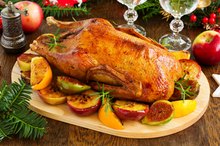Ground Turkey Protein Nutrition
You can use ground turkey for burgers, meatloaf, meatballs, tacos and almost any other recipe that usually uses ground beef. Ground turkey is high in protein and a source of essential vitamins and minerals. When you choose lean ground turkey and use it in healthy recipes, it might improve the quality of your diet.
Basic Information
Fat-free ground turkey has 112 calories in 100 grams, or 3.5 ounces. It has no carbohydrates and 2 grams of total fat. Fat-free ground turkey supplies 23.6 grams of protein, or 48 percent of the recommended daily value for protein. Since protein provides 4 calories per gram, this serving of fat-free ground turkey gets 94 calories from protein, or 84 percent of its total calories from protein. Ground turkey that is 85 percent lean has 180 calories, no carbohydrates, 12.5 grams of fat and 16.9 grams of protein. About 38 percent of the total calories are from protein.
- Fat-free ground turkey has 112 calories in 100 grams, or 3.5 ounces.
- Ground turkey that is 85 percent lean has 180 calories, no carbohydrates, 12.5 grams of fat and 16.9 grams of protein.
Protein Benefits
Nutritional Value of Hamachi Kama
Learn More
Protein is an essential nutrient for maintaining your lean muscle mass, for a strong immune system and for allowing vital processes to occur in your body. The protein from ground turkey is “high quality,” or complete. This means it provides each of the essential amino acids you need to get from your diet, according to the Harvard School of Public Health. Protein from all animal products, as well as from soy-based products, is high quality.
- Protein is an essential nutrient for maintaining your lean muscle mass, for a strong immune system and for allowing vital processes to occur in your body.
Saturated Fat and Cholesterol
A 100-gram serving of fat-free ground turkey has 55 milligrams of cholesterol and less than 0.5 grams of saturated fat, while 85 percent lean ground turkey has 78 milligrams of cholesterol and 3.4 grams of saturated fat. Cholesterol and saturated fat raise levels of cholesterol in your blood and might increase your risk for heart disease, according to the 2010 Dietary Guidelines from the U.S. Department of Health and Human Services 1. In addition to fat-free ground turkey, other lean, or low-fat, sources of protein include:
- egg whites
- chicken breast
- seafood
- tofu
Other Information
Gyro Meat Nutritional Information
Learn More
Compared to high-fat meats, such as ribs or fatty ground beef, low-fat, nutrient-dense sources of protein can help prevent weight gain while meeting your nutrient needs. Fat-free ground turkey is a source of heme iron, which is the form of iron easiest for your body to absorb. It is low in sodium, with only 51 milligrams in a 100-gram serving. To prevent your blood pressure from rising, the 2010 Dietary Guidelines from the U.S. Department of Health and Human Services recommend limiting sodium intake to 2,300 milligrams per day 1.
- Compared to high-fat meats, such as ribs or fatty ground beef, low-fat, nutrient-dense sources of protein can help prevent weight gain while meeting your nutrient needs.
Related Articles
References
- U.S. Department of Health and Human Services; Dietary Guidelines for Americans, 2010; January 2010
- FoodData central. Turkey, all classes, leg, meat and skin, cooked, roasted. U.S. Department of Agriculture. Updated 2019.
- Martone AM, Marzetti E, Calvani R, et al. Exercise and protein intake: A synergistic approach against sarcopenia. Biomed Res Int. 2017;2017:2672435. doi:10.1155/2017/2672435
- Cao Y, Strate LL, Keeley BR, et al. Meat intake and risk of diverticulitis among men. Gut. 2018;67(3):466-472. doi:10.1136/gutjnl-2016-313082
- Iron: Fact Sheet for Health Professionals. National Institutes of Health, Office of Dietary Supplements. Updated 2020.
- Skerrett PJ. Turkey: A Healthy Base of Holiday Meals. Harvard Health Publishing, Harvard Medical School. Updated 2012.
- Meat Allergy. American College of Allergy, Asthma & Immunology. Updated 2019.
- Laatsch DR. Raising turkeys as a 4-H or FFA project. Extension Dodge County University of Wisconsin-Madison. Updated 2012.
- Let's Talk Turkey—A Consumer Guide to Safely Roasting a Turkey. U.S. Department of Agriculture. Updated 2015.
Writer Bio
Natalie Stein specializes in weight loss and sports nutrition. She is based in Los Angeles and is an assistant professor with the Program for Public Health at Michigan State University. Stein holds a master of science degree in nutrition and a master of public health degree from Michigan State University.









